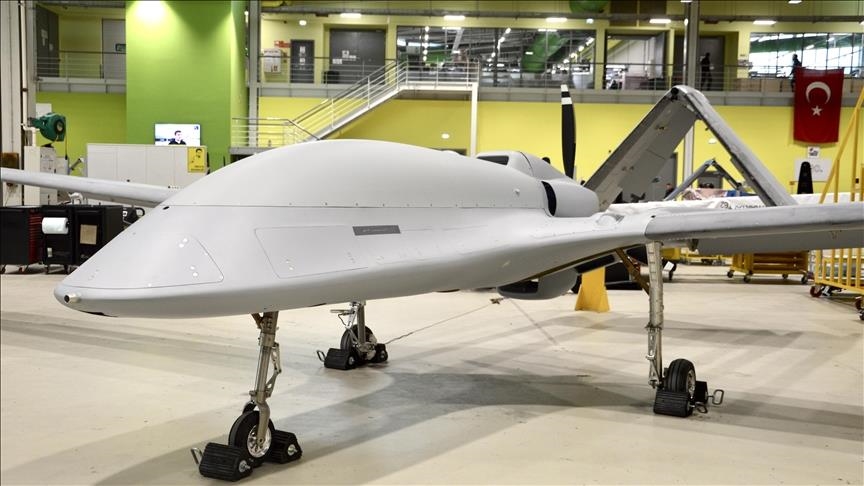Turkey’s thriving drone industry has witnessed another notable success as the country has successfully conducted the first high-speed roll test of the Bayraktar TB3 drone.
Turkish defense company Baykar revealed this development on its official X (formerly known as Twitter) account on October 13. The company also shared a video with the caption, “Bayraktar TB3 successfully completed its first high-speed roll test.”
In the video, the drone is seen departing from the hangar, followed by engineers engaged in preparing the drone before commencing the running test.
This development follows several months after Selcuk Bayraktar, the Chief Technology Officer of Baykar Technologies, shared images of the carrier-based combat drone, the Bayraktar TB3, in the production line.
The company did not specify the exact timeline for the completion of the drone’s testing phase. However, earlier reports have indicated an expected completion of the testing stage by the end of 2023.
#BayraktarTB3 ilk koşu testini başarıyla tamamladı. ✈️⚓️🚀#BayraktarTB3 successfully completed its first high speed roll test. ✈️⚓️🚀 pic.twitter.com/y6vqffGeMv
— BAYKAR (@BaykarTech) October 13, 2023
The Bayraktar TB3 is an armed unmanned aerial vehicle system designed for carrier operations, featuring foldable wings. It is slightly larger than its land-based predecessor, the Bayraktar TB2, and boasts an enhanced payload capacity of up to 280 kilograms.
This unmanned aircraft was initially introduced in October 2020 and is intended to operate from the TCG Anadolu amphibious assault ship eventually.
Furthermore, the TB3 is expected to operate with the Bayraktar Kizilelma, a carrier-capable jet-powered unmanned combat aerial vehicle.
The Bayraktar Kizilelma combat drone achieved its maiden flight at the Akinci Flight Training and Test Center in Corlu, northwestern Turkey, on December 14, 2022.

This drone has a payload capacity of 1,500 kilograms and is designed to perform air-to-ground and air-to-air missions.
The Kizilelma, as asserted by the company, exhibits exterior characteristics reminiscent of fifth-generation fighter jets. Baykar additionally asserts that this drone will be proficient in traditional drone missions and conducting air-to-air engagements.
Bayraktar TB3 Unmanned Aerial Vehicle
The Bayraktar TB3 drone, a successor to the widely acclaimed TB2, renowned for its achievements in conflicts across Libya, Syria, Nagorno-Karabakh, and Ukraine, stands apart in its design.
Distinguishing itself from its predecessor, the TB3 is purposefully designed as a naval drone equipped for operations from short runways and ship decks.
The TB3 UCAV can perform intelligence, reconnaissance, and surveillance missions and carry out assault operations by deploying smart weapons mounted under its wings.
TB3 UAV surpasses TB2 in size and capabilities. It measures 8.3m in length, 2.6m in height, and has a 14m wingspan, while TB2 is 6.5m long, 2.2m high, and has a 12m wingspan.
Moreover, TB3 can carry 280kg, compared to TB2’s 150kg, and has a maximum takeoff weight of 1,450kg, nearly double that of TB2 at 700kg.
This advanced drone will operate from the Turkish Navy’s latest flagship, the TCG Anadolu (L-400), an amphibious assault ship modeled after Spain’s Juan Carlos.
Initially, Turkey had considered procuring a limited number of fifth-generation F-35B Lightning II short-takeoff and vertical landing (STOVL) fighters for the Anadolu.
However, these intentions were derailed in 2019 when Ankara procured advanced S-400 air defense missile systems from Russia, which led to its expulsion from the F-35 program.
As an alternative, Turkey shifted its strategy and primarily deployed the Anadolu as a dedicated drone carrier, leveraging its well-established capabilities in developing and deploying armed drones.
With the convenience of foldable wings, the Anadolu could potentially host a fleet of 30 to 50 TB3 drones.
According to Turkish media reports, the landing helicopter dock (LHD) type ship, TCG Anadolu, is the world’s first vessel of its kind designed to accommodate the landing of Unmanned Combat Aerial Vehicles (UCAVs) on its deck.
Meanwhile, the Turkish defense company hopes this drone will replicate the success of its forerunner, TB-2, which is reputed to have been exported to approximately 28 countries.
In 2022, Haluk Bayraktar, serving as the CEO of Baykar Defense, made the case that this particular drone model could be exceptionally well-suited for the Japanese military. “The upcoming TB3 will be a great fit for Japan’s Izumo-class platforms,” said Haluk Bayraktar.
Nonetheless, the future will reveal whether this drone, primarily tailored for naval operations, can attain a level of success akin to its predecessor.
- Contact the author at ashishmichel(at)gmail.com
- Follow EurAsian Times on Google News